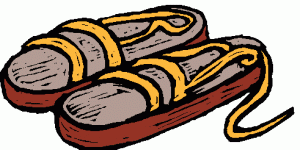[The Bible is an “Eastern” book. It was written many years ago in the “East” which today we refer to as “The Middle East.” As such, there are many customs and idioms that are not familiar to the “Western” mind.]
In the Gospels, you read of Jesus sending out the twelve to preach. One of the things he told them was that if people didn’t want to hear what they had to say they were to depart and, “shake off the dust of your feet.”
Paul and Barnabas in Acts, Chapter 13, “shook off the dust of their feet,” when they were expelled out of Antioch.
To our Western minds that sounds a little odd. In fact, it almost sounds a little arrogant. But, again, understanding the Eastern mind gives us great insight.
It Is Not Literal
First of all, it is not literal. They did not take off their sandals and shake the dust off. It is an Eastern idiom. It has to do with what you walk away with in your mind, what you carry in your mind.
an Eastern idiom. It has to do with what you walk away with in your mind, what you carry in your mind.
This Eastern idiom means to shake off any animosity or bitter feelings which you may have toward someone. In doing so, when you leave, you leave with peace in your heart and mind. You don’t take with you any resentment for others. In other words, don’t take any anger, hurt, blame or regret with you when you leave.
If Jesus sent you out to preach, then you would certainly want people to respond favorably to the message. But when people don’t respond favorably, you might be tempted to be upset with them. How could they refuse? What’s wrong with them?
Shaking the dust means that you don’t carry any of that with you. And the same is true if they treat you poorly. You don’t carry any of that with you either. You leave it all there and move on.
Leave It All Behind
Shaking off the dust means you leave all thoughts of ill feeling behind, and move forward with God’s peace in your heart and mind. It is the responsibility of those who hear the message what they do with it – accept it or reject it.
Sometimes Christians feel obligated to make people accept the Good News and obligated to make them believe something. When you share the Good News you are simply a messenger, like the twelve were, like Paul and Barnabas. You and I are not responsible for people’s response. And you really don’t want to allow people’s negative responses to weigh you down in your mind.
Shake the dust from your feet, and move on.
Matthew 10:14:
And whosoever shall not receive you, nor hear your words, when ye depart out of that house or city, shake off the dust of your feet.Mark 6:11:
And whosoever shall not receive you, nor hear you, when ye depart thence, shake off the dust under your feet for a testimony against them.Luke 9:5:
And whosoever will not receive you, when ye go out of that city, shake off the very dust from your feet for a testimony against them.Acts 13:51:
But they shook off the dust of their feet against them, and came unto Iconium.
Feel free to leave a comment. We’d love to hear what you have to say.
For more “Eastern Eye” articles, Click Here, or click The Eastern Eye tab above.
Mike Verdicchio
————–
There are a number of books that you can read to get insight on customs, manners, idioms and meanings from the Eastern culture in which the Bible was written. The best I know of were written by by Bishop K. C. Pillai. I have had the pleasure of listening to recorded teaching by him.
He wrote three books, and they are hard to find, and are usually over priced. But, if you want to you can check this link to see what Amazon has to offer. Light Through an Eastern Window
Another great resource that I have used for years is a book called, “Manners and Customs of the Bible,” by James Freeman. Mine was printed in 1972 and I know they have newer additions. For the newest edition, just click the link and it will take you to Amazon. The New Manners and Customs of the Bible (Pure Gold Classics)
